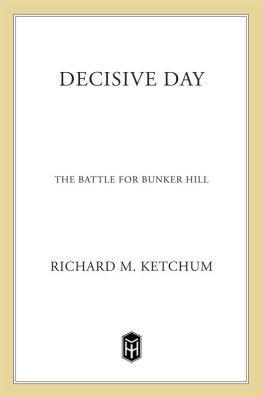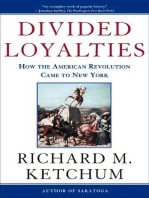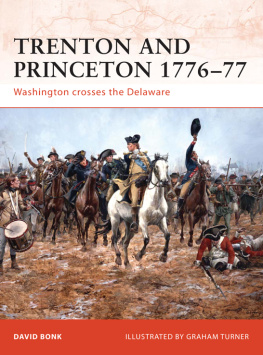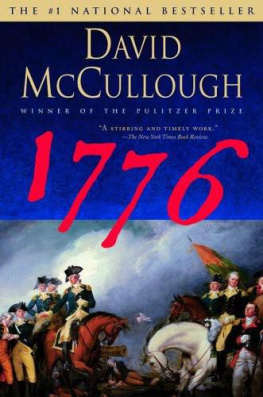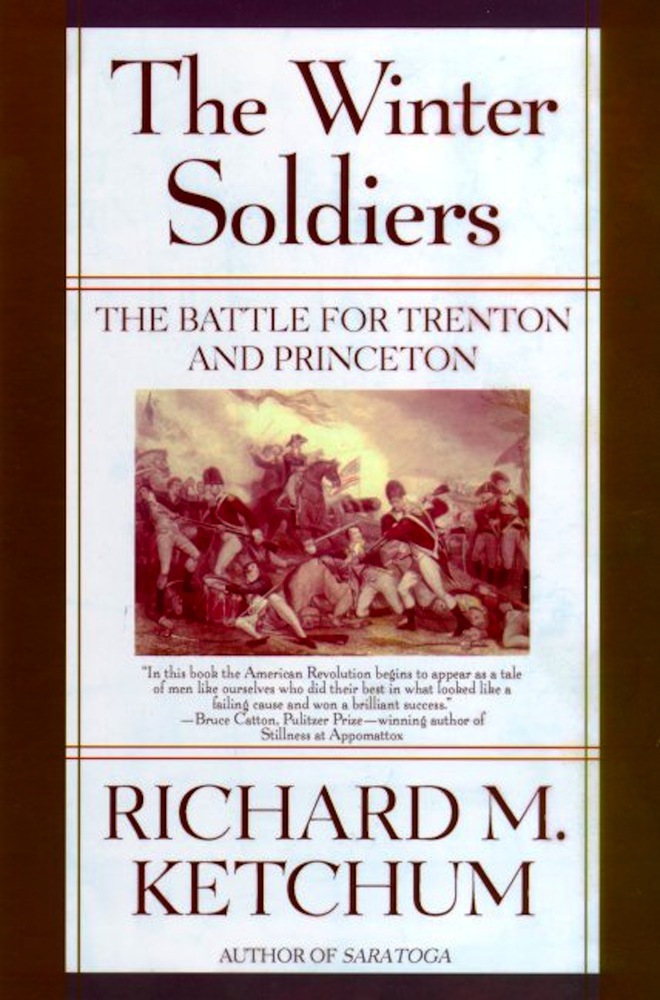Contents
Guide

The author and publisher have provided this e-book to you for your personal use only. You may not make this e-book publicly available in any way. Copyright infringement is against the law. If you believe the copy of this e-book you are reading infringes on the authors copyright, please notify the publisher at: us.macmillanusa.com/piracy.
CONTENTS
Maps
for Liza, Casey, and Tom
CHAPTER ONE
1. A Gentleman from England with Genius in His Eyes
In the raw, unsightly camps west of the Hudson the American army was in trouble. Early in October 1776 a New York militia colonel who suffered with the name of Ann Hawkes Hay poured out his problem to Peter Livingston, the president of the New York Convention in Fishkill. Almost half of his regiment at Haverstraw, Hay reported, lacked weapons and he wondered what in the world he should do or where he could look for reinforcements if the enemy attempted a landing there. He was short of money to pay his men and a few days earlier he had been unable to collect more than thirty-eight of them together, even after repeated summons to duty. Several British cutters had sailed upriver and fired at the shore, damaging Hays own house and taking away a piece of the hat he was wearing, but despite this real and present danger his soldiers complained that if they left their farms their families would starve; there had been no opportunity to harvest corn or buckwheat and they had been so busy all summer with what Hay called the publick troubles that there had not been time to sow winter grain. Worse yet, some of them felt that the Congress in Philadelphia had done the country no favor by rejecting the British governments overtures for reconciliation; all his men cared about, Hay said, was peace, liberty, and safety, and if they could only have that, they would be content.
When Hay took his griefs to Major General Nathanael Greene, who commanded Fort Lee on the crest of the New Jersey Palisades, Greene considered them worrisome enough to bring to the attention of the commander in chief, George Washington, even though he intended to settle the matter himself. Greene was an independence man through and through, and he made it clear to Hay that he had no patience with the mens grousing. If they didnt follow orders, Hay should send them down to Fort Lee, where Greene would see that they did.
Actually, Greene had a morale problem too. The number of men stationed near the fort varied anywhere from 200 to 2,000, and the presence of that many additional people in a farm community was bound to create friction. When Lieutenant Joseph Hodgkins of the Massachusetts Line wrote to his wife on September 30, he said that he had been in the area for ten days and would be glad to stay longer: I have been at the trouble of building a log house with a stone chimney, he told her. I got it fit to live in three days ago, before which I had not lodged on anything but the ground. The difficulty was that those logs, like many others that had gone into soldiers huts, came from one of the nearby farms. In this neighborhood the fences were laid up French style, five rails high, one on top of another, and nothing could be handier for building. A farmer named Peter Bourdet, whose rocky, wooded land had been cleared for the construction of Fort Lee during the summer, complained that the fences around 125 acres of his pasture had been torn down by the troops and that he had lost three acres of corn and four of flax and oats as well. A lot of the soldiers were sick and so many more were deserting that Hugh Mercer, who was in charge of a mobile reserve known as the Flying Camp, near Perth Amboy, doubted if Washington could muster five thousand dependable troops. He feared the worst if the poorly armed, badly disciplined militiamen he had seen, who were perpetually fluctuating between the camp and their farms, had to face General William Howes British veterans.
Yet, as George Washington assured his old friend Mercer, it was not entirely the mens fault; after all, Men who have been free, and subject to no control, cannot be reduced to order in an instant. All this confusion was the natural result of inexperience, and inexperience was what the Continental Army seemed to have most of in the fall of 1776. It had been in existence for little more than a year and as yet few soldiers had any real training or knowledge of military matters, and their officers were not much better off. Mercer, who was now a brigadier general, had been a physician in Fredericksburg, Virginia, until a year before. Nathanael Greene, who had served in a Providence, Rhode Island, militia company, had seen no active service until May of 1775. And eighteen months later, as he tried to cope with the never-ending series of problems involving the troops, Greene began to wonder if there would ever be any leisure time in which to reflect upon matters of great importance when he had to devote so many hours to paper work. It was this that confines my thoughts as well as engrosses my time, he grumbled. It is like a merchandise of small wares. Fortunately, within the past month Greene had found someone to help him with letters and reports, and a highly unusual aide-de-camp he was. The Rhode Island officers reputation for impulsiveness didnt fully explain his choice of an Englishman who had been in the colonies for less than two years, who was also a civilian with no military experience. But Greene was desperate for help and he was undoubtedly pleased to acquire a staff member who was one of the most celebrated figures in America.
The new arrival had spent some time in Philadelphia, where he had impressed a number of people, including one of the Massachusetts delegates to the Continental Congress, John Adams. His name is Paine, Adams wrote to a friend, a gentleman about two years from Englanda man who, General Lee says, has genius in his eyes. Genius might be there, but what was more quickly apparent behind the dark, penetrating eyes, beaked nose, and a sensuous mouth that threatened to break into a grin at any moment was an impression that the fellow was looking through you, probing to see what was there. It was not easy to be comfortable in the presence of this Paine.
If ever there was a case of an individual and an idea that came together at the right moment, Thomas Paine was it. He had been driven to the New World by a succession of personal failures and a festering hatred for the society which had brought them about. The son of a poor Thetford corset maker, he had picked up a rudimentary education before going to work for his father as an apprentice staymakeran occupation he disliked so intensely that he ran away from home at sixteen, went to sea, and served aboard a privateer in the Seven Years War. Sick of that, he jumped ship and turned up in London, to work at various jobsstaymaker, cobbler, cabinetmaker, tax collector, along with brief sallies into other fields, always skating on the thin edge of defeat, barely avoiding debtors prison. His first marriage, to a servant girl, ended with his wifes death a year later; a second ended in separation. Like so many other Englishmen, Paine was a victim of enclosure laws enacted two centuries earlier which had remorselessly forced thousands of small farmers off the land and into the cities. There the luckier, more adaptable ones formed the nucleus of a working class for the industries beginning to spring up in English towns. The less fortunate turned to begging or thieving or worse: in the streets of London Tom Paine witnessed every form of human degradationmurder, drunkenness, brutality, starvation. Not a day passed, he said, but that he saw ragged and hungry children, and persons of seventy and eighty years of age, begging in the streets. Workers were reduced to serfs, a rigid, inequitable class system marked men for life, and the lower classes were brutalized by a savage criminal code that would hang a ten-year-old boy for stealing a penknife or permit women to be stoned to death in the pillory. Epidemics of disease were a commonplace in the vile, stinking slums; infant mortality was unbelievably high; and with death its handmaiden, life was cheap. Somehow or other, Paine managed to stay afloat in the murky cesspool of lower-class London; somehow he wangled an introduction to the famous Benjamin Franklin and obtained a letter of recommendation from the American ambassador extraordinary; and somehow he left England in October 1774, bound for a new land and a new tomorrow.


